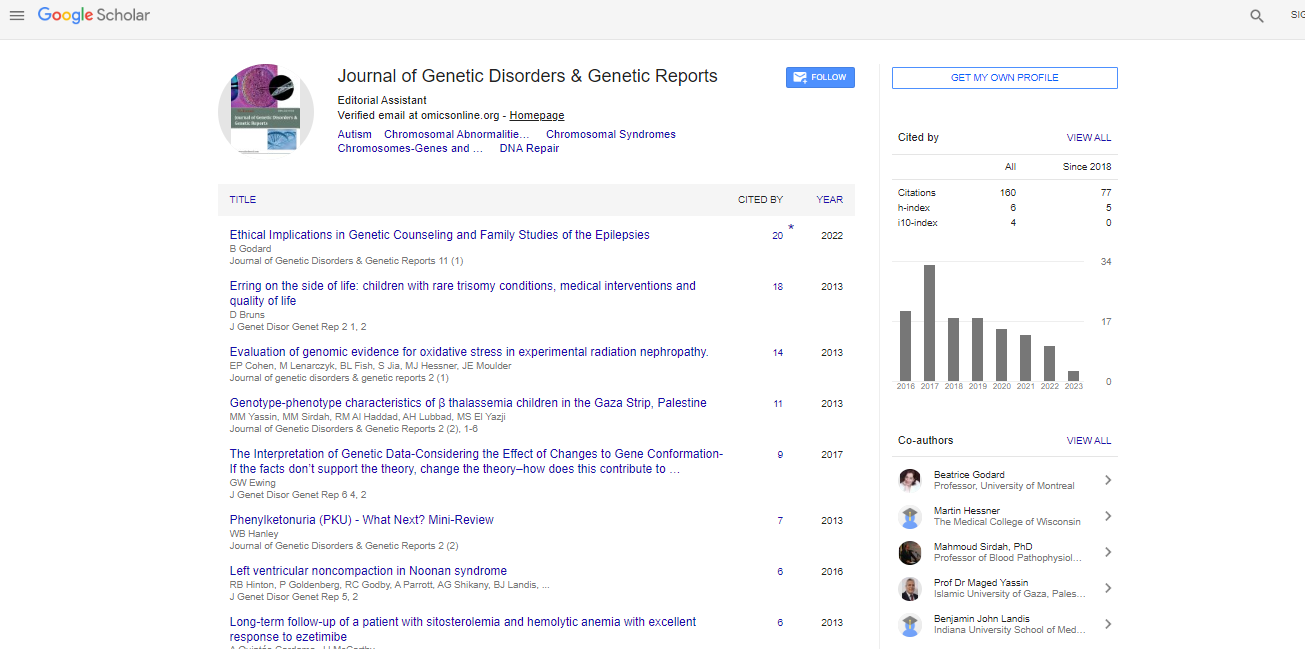Commentary, J Genet Disor Genet Rep Vol: 10 Issue: 12
Pre-Implantation Genetic Diagnosis is the Hereditary Profiling of Undeveloped Organisms
Carter Dickson*
Department of Preimplantation Genetics, University of Jimma, Jimma, Ethopia
- Corresponding Author:
- Carter Dickson
Department of Preimplantation Genetics, University of Jimma, Jimma, Ethopia
E-mail : C_Dickson@ked.lui.zn.et
Received Date: 09 December, 2021; Accepted Date: 23 December, 2021; Published Date: 30 December, 2021
Keywords: Mutations & Functional Consequences, Chromosomes, Genes and DNA variations, Environmental genetics, Population Genetics and Evolution
Description
Pre-implantation Genetic Diagnosis (PGD or PIGD) is the hereditary profiling of undeveloped organisms preceding implantation (as a type of incipient organism profiling) and once in a while even of oocytes before treatment. PGD is considered along these lines to pre-birth analysis. At the point when used to evaluate for a particular hereditary sickness, its principle advantage is that it keeps away from specific early termination, as the strategy makes it almost certain that the child will be liberated from the illness viable. PGD in this manner is a subordinate to helped conceptive innovation, and expects In Vitro Fertilization (IVF) to get oocytes or incipient organisms for assessment. Incipient organisms are for the most part acquired through blastomere or blastocyst biopsy. The last procedure has ended up being less malicious for the incipient organism, in this manner it is fitting to play out the biopsy around day 5 or 6 of improvement.
Mosaicism
The term Preimplantation Genetic Screening (PGS) alludes to the arrangement of procedures for testing whether incipient organisms (acquired through IVF/ICSI) have unusual chromosomes number. At the end of the day, it tests in the event that an incipient organism is aneuploid or not. PGS is additionally called aneuploidy screening. PGS was renamed Preimplantation Genetic Diagnosis For Aneuploidy (PGD-A) by Preimplantation Genetic Diagnosis International Society (PGDIS) in 2016. The PGD permits concentrating on the DNA of eggs or incipient organisms to choose those that convey specific transformations for hereditary illnesses. It is valuable when there are past chromosomal or hereditary problems in the family and inside the setting of in vitro treatment programs [1].
The systems may likewise be called preimplantation hereditary profiling to adjust to the way that they are some of the time involved on oocytes or undeveloped organisms before implantation for different reasons than conclusion or screening. Strategies performed on sex cells before treatment may rather be alluded to as techniques for oocyte determination or sperm choice, albeit the strategies and points incompletely cross-over with PGD. Preimplantation Genetic Profiling (PGP) has been recommended as a strategy to decide incipient organism quality in vitro treatment, to choose an incipient organism that seems to have the best opportunities for fruitful pregnancy. In any case, as the aftereffects of PGP depend on the appraisal of a solitary cell, PGP has innate constraints as they tried cell may not be agent of the undeveloped organism in view of mosaicism [2]. Moreover, an investigation discovered that analyses of the biopsies from similar undeveloped organisms at two separate labs matched up just half of the time. A deliberate survey and meta-investigation of existing randomized controlled preliminaries came to the outcome that there is no proof of a valuable impact of PGP as estimated by live rate of birth [3,4]. Going against the norm, for ladies of cutting edge maternal age, PGP essentially brings down the live rate of birth. Specialized downsides, for example, the obtrusiveness of the biopsy, and chromosomal mosaicism are the major fundamental variables for inefficacy of PGP. Ordinary live births of sound posterity after moves of incipient organisms considered aneuploid by PGP have been accounted for around the world.
Hemophilia
On account of families in danger for X-connected infections, patients are given a solitary PGD examine of orientation recognizable proof. Orientation choice offers an answer for people with X-connected infections who are currently getting pregnant. The determination of female incipient organism posterity is utilized to forestall the transmission of X-connected passive infections. Such X-connected Duchenne Muscular Dystrophy (DMD), and hemophilia A and B, which are seldom found in females on the grounds that the posterity is probably not going to acquire two duplicates of the latent allele. Since two duplicates of the freak X allele are expected for the sickness to be given to the female posterity, females will best case scenario be transporters for the infection yet may not really have a prevailing quality for the illness. Guys then again just require one duplicate of the freak X allele for the illness to happen in one's aggregate and subsequently, the male posterity of a transporter mother has a half possibility having the sickness. Reasons might incorporate the uncommonness of the condition or on the grounds that impacted guys are reproductively impeded [5]. In this manner, clinical employments of PGD for choice of a female posterity to forestall the transmission of X-connected Mendelian passive issues are frequently applied. Preimplantation hereditary conclusion applied for orientation determination can be utilized for non-Mendelian problems that are fundamentally more common in one sex. Three appraisals are made preceding the commencement of the PGD cycle for the anticipation of these acquired problems. To approve the utilization of PGD, orientation determination depends on the earnestness of the acquired condition, the danger proportion in one or the other sex, or the choices for sickness therapy.
References
- Sullivan-Pyke C, Dokras A (2018) Preimplantation genetic screening and preimplantation genetic diagnosis. Obstet Gynecol Clin 45: 113-125.
- Handyside AH, Kontogianni EH, Hardy K, Winston RL (1990) Pregnancies from biopsied human preimplantation embryos sexed by Y-specific DNA amplification. Nature 344: 768â??770.
- Natsuaki MN, Dimler LM (2018) Pregnancy and child developmental outcomes after preimplantation genetic screening: A meta-analytic and systematic review. World J Pediatr 14: 555-569.
- Handyside AH (2018) Designer babies almost thirty years on. Reproduction 156: 75-79.
- Daniels R, Holding C, Kontogianni E , Monk M (1996) Single-cell analysis of unstable genes. J Assist Reprod Genet 13: 163-169.
 Spanish
Spanish  Chinese
Chinese  Russian
Russian  German
German  French
French  Japanese
Japanese  Portuguese
Portuguese  Hindi
Hindi 



